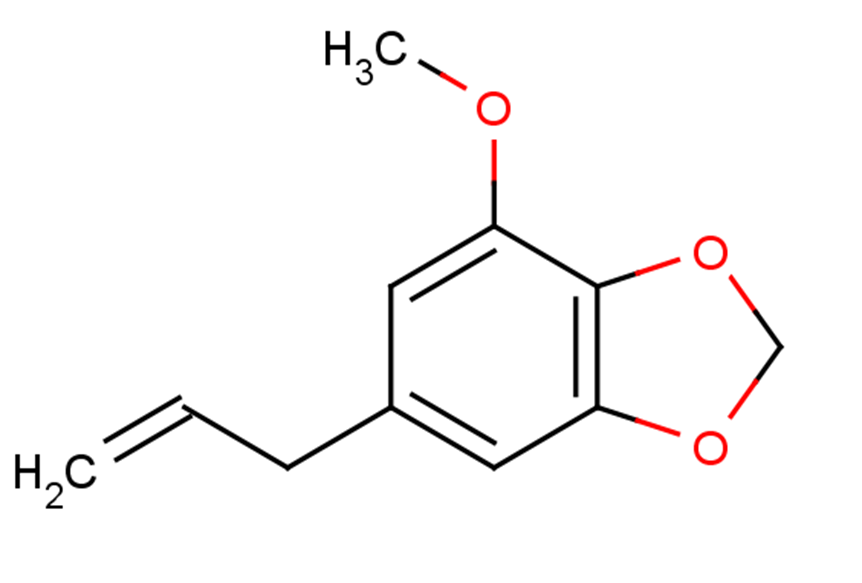
Myristicin
CAS No. 607-91-0
Myristicin ( Myristicine )
Catalog No. M22625 CAS No. 607-91-0
Myristicin is a natural product found in spices and umbelliferous plants.?Myristicin has anti-cholinergic, antibacterial, and hepatoprotective effects, it also has anti-inflammatory properties related with its inhibition of NO, cytokines,chemokines, and growth factors in dsRNA-stimulated macrophages via the calcium pathway.?
Purity : >98% (HPLC)
 COA
COA
 Datasheet
Datasheet
 HNMR
HNMR
 HPLC
HPLC
 MSDS
MSDS
 Handing Instructions
Handing Instructions
| Size | Price / USD | Stock | Quantity |
| 5MG | 65 | In Stock |


|
| 10MG | 87 | In Stock |


|
| 25MG | 146 | In Stock |


|
| 50MG | 214 | In Stock |


|
| 100MG | 322 | In Stock |


|
| 200MG | Get Quote | In Stock |


|
| 500MG | Get Quote | In Stock |


|
| 1G | Get Quote | In Stock |


|
Biological Information
-
Product NameMyristicin
-
NoteResearch use only, not for human use.
-
Brief DescriptionMyristicin is a natural product found in spices and umbelliferous plants.?Myristicin has anti-cholinergic, antibacterial, and hepatoprotective effects, it also has anti-inflammatory properties related with its inhibition of NO, cytokines,chemokines, and growth factors in dsRNA-stimulated macrophages via the calcium pathway.?
-
DescriptionMyristicin is a natural product found in spices and umbelliferous plants.?Myristicin has anti-cholinergic, antibacterial, and hepatoprotective effects, it also has anti-inflammatory properties related with its inhibition of NO, cytokines,chemokines, and growth factors in dsRNA-stimulated macrophages via the calcium pathway.?Myristicin may antagonize the anxiolytic effects of midazolam, increase anxiety, and affect motor movements.?Myristicin can induce apoptosis as characterised by alterations in the mitochondrial membrane potential, cytochrome c release, caspase-3 activation, PARP-cleavage and DNA fragmentation.?Myristicin (1-allyl-5-methoxy-3,4-methylenedioxybenzene) is an active aromatic compound found in nutmeg (the seed of Myristica fragrans), carrot, basil,cinnamon, and parsley. Myristicin has been known to have anti-cholinergic, antibacterial,and hepatoprotective effects, however, the effects of Myristicin on virus-stimulated macrophages are not fully reported. METHODS AND RESULTS:In this study, the anti-inflammatory effect of Myristicin on double-stranded RNA (dsRNA)-stimulated macrophages was examined. Myristicin did not reduce the cell viability of RAW 264.7 mouse macrophages at concentrations of up to 50 μM. Myristicin significantly inhibited the production of calcium, nitric oxide (NO),interleukin (IL)-6, IL-10, interferon inducible protein-10, monocyte chemotactic protein(MCP)-1, MCP-3, granulocyte-macrophage colony-stimulating factor, macrophage inflammatory protein (MIP)-1α, MIP-1β, and leukemia inhibitory factor in dsRNA[polyinosinic-polycytidylic acid]-induced RAW 264.7 cells (P < 0.05). CONCLUSIONS:In conclusion,Myristicin has anti-inflammatory properties related with its inhibition of NO, cytokines,chemokines, and growth factors in dsRNA-stimulated macrophages via the calcium pathway.
-
SynonymsMyristicine
-
PathwayMicrobiology/Virology
-
TargetAntifection
-
RecptorAntifection;Bcl-2;Caspase;CYP17;GABA Receptor;IL Receptor;NO;PARP
-
Research Area——
-
Indication——
Chemical Information
-
CAS Number607-91-0
-
Formula Weight192.21
-
Molecular FormulaC11H12O3
-
Purity>98% (HPLC)
-
Solubility——
-
SMILESCOc1cc(CC=C)cc2OCOc12
-
Chemical Name——
Shipping & Storage Information
-
Storage(-20℃)
-
ShippingWith Ice Pack
-
Stability≥ 2 years
Reference
1. Anti-inflammatory effect of myristicin on RAW 264.7 macrophages stimulated with polyinosinic-polycytidylic acid. Molecules. 2011;16(8):7132-42.
molnova catalog


related products
-
1,3-Dithiane
1,3-Dithiane is a protected formaldehyde anion equivalent that could serve as a useful labeled synthon. 1,3-Dithiane is also a sulfur-containing Maillard reaction products found in boiled beef extracts.
-
Trichorabdal A
Trichorabdal A shows a very strong in vitro antibacterial activity against Helicobacter pylori.
-
Torachrysone-8-O-b-D...
Torachrysone 8-O-glucoside shows alpha-glucosidase inhibitory activities, it may be used for the management of type 2 diabetes.



 Cart
Cart
 sales@molnova.com
sales@molnova.com


